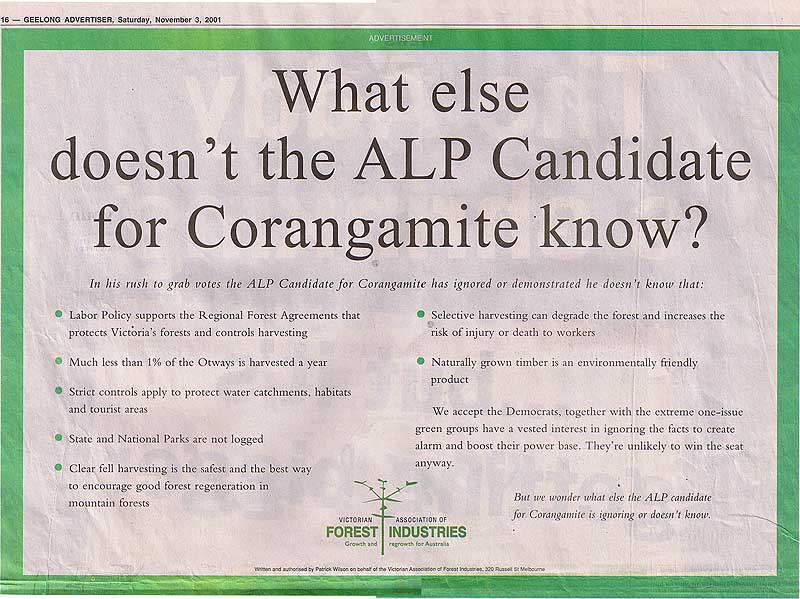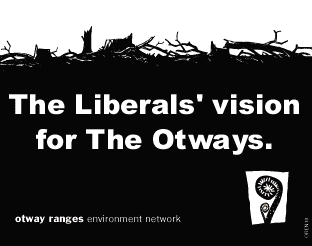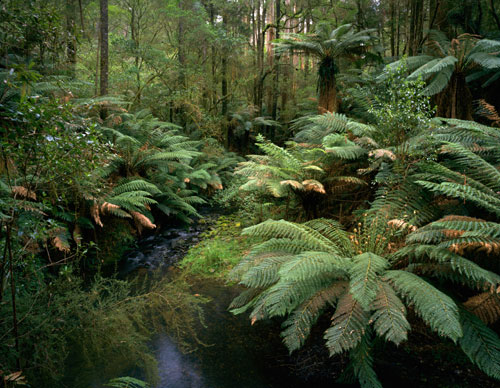
Otways/OREN campaign destroyed the
Regional Forest Agreement process.
Former Premier Steve Bracks cancelled West Regional Forest Agreement.
On the 5th of October 2004 the former Premier of Victoria, Steve Bracks acknowledged in State Parliament what most in the Otway forest debate already knew. That is, the West Regional Forest Agreement or West RFA, was cancelled when Mr Bracks announced new Otway policies at Triplet falls in the Otways on the 6th November 2002. "Mr BRACKS (Premier) -- We took action to cancel
one of our regional forest agreements here in Victoria, which I committed
to at the last election when I committed to creating a new national park
in the Otway Ranges." Former Premier Bracks is the only State Premier to ever have cancelled a Regional Forest Agreement in its entirety anywhere in Australia!! This very significant acknowledgment put a halt to the native forest woodchip industries strategy to obtain Victorian State legislated 'resource security' through the Regional Forest Agreement process. |
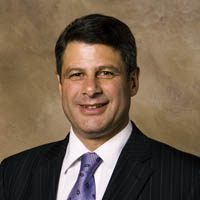 Former Premier of Victoria, Steve Bracks. (1999-2007) |
The demise of the West Regional Forest Agreement.
- The RFA process.
- West RFA process was destroyed by broad community participation.
- After the West RFA was signed and before it was cancelled
3.1 Water issues undermined West RFA credibility.
3.2 The community rejected the RFA after it was signed.
3.3 Native forest woodchip industry failed to get RFA's legislated
3.4 VAFI 2002 pre-election campaign acknowledges RFA's under threat.
3.5 OREN challenges VAFI
- The 2002 Victorian State election
4.1 RFA support split major parties during 2002 Victorian State election.
4.2 Liberals were electorally punished for their RFA support.
4.3 Logging industry advertised Regional Forest Agreement demise.
4.4 Logging industry anti Otway election campaign(2002) focused on Morwell, not Geelong.
- OREN / Otways campaign a “Watershed”. Loggers pay tribute to OREN.
1. The RFA process.
The Regional Forest Agreements (or disagreement) (RFA) was a process that was meant to provide the final solution to the forest debate in Australia. The process was imposed on the community by both the State and Federal Governments over a five year period.
The RFA's are strongly supported by the forestry bureaucracies, native forest logging industry and forest unions in all States. These industry groups wanted the RFA’s to provide long term legislated ‘resource security'. This 'resource security' was to legally lock in guaranteed volumes of woodchips and sawlogs for at least 20 years from public native forests across Australia. Logging interests also wanted the legislation to stop more public forested land being made unavailable for clearfell logging due to ongoing community opposition and lobbying.
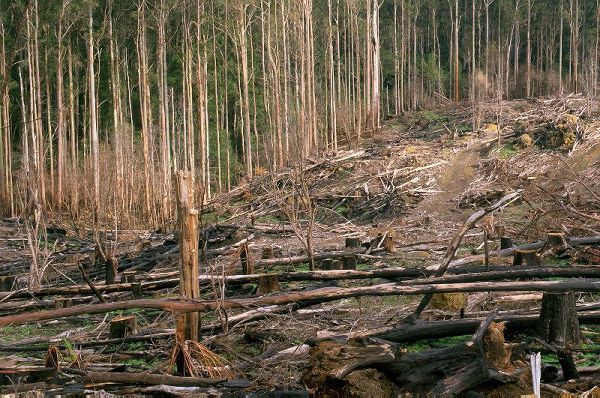
Regional Forest Agreements are all about clearfell logging for woodchips.
Above is forest clearfell logged in Geelong's domestic water supply catchment after the West Regional Forest Agreement was signed.
The bonus for the Commonwealth Government involvement in the RFA process was to free Federal politicians from the troublesome problem of setting export native forest woodchip licences each year, a process which in the 1990's always created a lot of controversy during an election year.
In Australia there were meant to be eleven RFA’s located in Victoria (5), NSW (4), Qld(1 never completed), WA(1) and Tasmania(1).
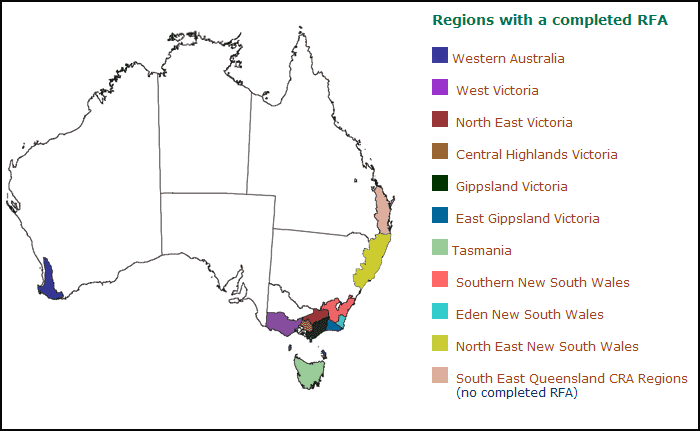
This map is sourced from Commonwealth DAFF website. (Note :DAFF still does not recognise the that West RFA is cancelled.)
The West RFA which includes the Otway forests, was one of the last ones completed and signed by both the Federal and State governments on the 31st of March 2000. The West RFA included other forest areas near Portland and Daylesford.
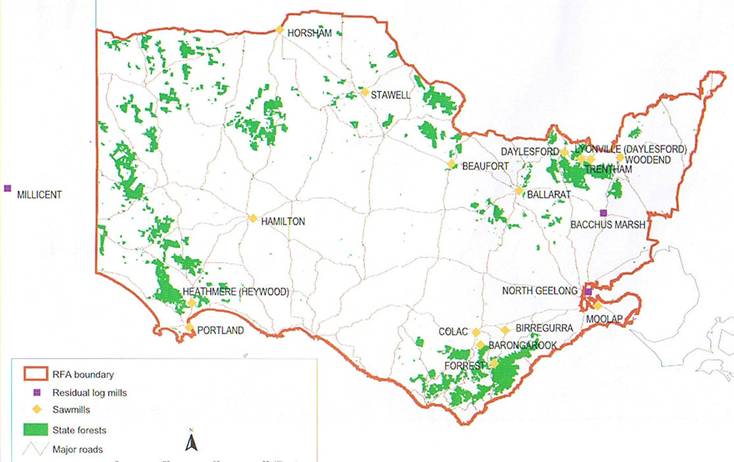 Official RFA map showing boundary. Note "Residual log mill" in North Geelong is Midways, and is not in the study area despite being the biggest recipient of native forest trees from the West RFA study area at the time.
Official RFA map showing boundary. Note "Residual log mill" in North Geelong is Midways, and is not in the study area despite being the biggest recipient of native forest trees from the West RFA study area at the time.
The final part of the RFA process was for both the State and Federal governments to provide complementary RFA legislation to give them legal standing. The Federal Government did this but the Victorian State Government has not. Hence the five Victorian RFA's out of a total of ten completed Australia wide (half the total) have not been legislated at a State level as required by the RFA process. The State Governments that have provided complementary legislation are only in Tasmania, NSW. Huge community opposition to clearfell logging old growth forests in Western Australia in 1999 resulted in that RFA being amended and then ignored by the WA State Government.
2. West RFA process was destroyed by broad community participation.
The fact that the community stood up for their water supply by participating in the West RFA process was one of the key reasons the West RFA was later torn up by the Victorian State government only a few years after it was signed.
Every conservationist knew the RFA terms of reference were fundamentally flawed. The process prioritised continued logging over all other non-timber forest values. By the time the West RFA started, three RFA had already been signed in Victoria. In general peak environment groups (Wilderness Society, Australian Conservation Foundation, Environment Victoria etc) boycotted each RFA process in protest against the fact the RFA’s had a strong bias towards logging. For example in 1997 peak environment groups released a press release(pdf) that announced they were boycotting the Central Highlands RFA.
However by not participating in the RFA process, the peak environment groups boycott effectively gave the native forest logging industry a free arm to lobby the State and Federal governments to get most of what they wanted out of each RFA process.
However during the West RFA, OREN and other regional conservation groups participated in the process and encouraged other community groups to do the same. Their strategy was to focus on non-timber forest values such as tourism, water and nature conservation and to use the West RFA process as a tool to promote these values throughout the community. Within the Geelong community, OREN worked with the Geelong Community Forum(GCF) and Geelong Environment Council to expose the fact that the urban community of Geelong was being locked out of the West RFA process. This was despite the Geelong water supply catchments being directly affected by a RFA agreement locking in 20 years of continuous logging. Campaigning under the banner of “Our Water, Our Forests, Our Future” the GCF ran several large public forums in the Geelong West Town Hall (See example), encouraged letter writing to the local newspapers, held a submission writing workshop, organised local protests, coordinated a petition to the State Parliament, lobbied the City of Greater Geelong and Barwon Water, and attended meetings with forestry bureaucrats and the Environment Minister The Otway logging / RFA issue become a political and personal issue for the 300,000 people in the Geelong region who rely on water from forested areas being clearfell logged in the Otway water supply catchments. |
 Geelong resident trying to have a shower with woodchips rather than water from the Otways. Source GCF publication. Geelong resident trying to have a shower with woodchips rather than water from the Otways. Source GCF publication. |
The West RFA included State forest areas near Portland and Daylesford. During the West RFA process, OREN and GCF worked with other regional conservation groups including the Wombat Forest Society and Portland Field Naturalists and together set up a joint group called West Victorian Forest Protection Network (WVFPN), partly funded by a grant from the Commonwealth government. The WVFPN provided regional support to produce submissions, public meetings, track the RFA process and rally community opposition to the West RFA process across Western Victoria.
In response to growing community concern, Environment Minister Garbutt set up a West Victorian Independent Panel to review all RFA public submissions. A public presentation process occurred between 17 January and 3 March 2000, with a report made publicly available days after the West RFA was signed. The West Victorian Independent Panel recorded the fact there was significant public opposition to logging in the Otways before the West RFA was signed. (See report and extracts).
A positive outcome from the West RFA was the maximum annual rates of logging for sawlogs in the Otways was reduced from 44,000 cubic metres to 27,000 cubic meters. This logging rate reduction had the effect of reducing the number of logging crews working over summer in the Otways from eight to five. This took some pressure off the rate of forest destruction. However the native forest logging industry rather than accepting that the cutbacks were a result of the forestry bureaucracy and past State governments incompetently allowing over logging to occur, instead wanted to forgive the forestry bureaucracy and allow high levels of logging to continue by compromising environmental values. Some loggers and irresponsible federal politicians wanted environmental laws relaxed so the landscape intensity of logging could be increase to compensate for the past failures of forestry bureaucracies. The forestry union officials selfishly argued that the forestry bureaucracy errors could be overlooked by protecting less forests so clearfell logging rates could stay the same. |
Logging plan a threat to reserves The timber industry in western Victoria is pushing for logging along side streams and for fewer conservation reserves in a desperate bid to lift the amount of timber felled in native forests. |
Further public opposition to the RFA was expressed on Saturday 4th March 2000 during a rally against the West RFA in Geelong at the Midway export woodchip mill. This rally was attended by hundreds of people who lived throughout Western Victoria.
On the eve of the RFA being signed, it was clear that the conflict over logging in the Otways was far from over. The RFA process had totally failed in its objective to resolve contentious forest the issues and provide woodchip resource security.
The media reported the federal and state bureaucracy that had overseen the RFA process was responsible for its failure by not providing an honest and transparent consultation process for the whole community. An article in the Geelong Advertiser by journalist Noel Murphy exposed the whole RFA process as a "fait accompli".
See "Regional Forest Disagreement" Geelong Advertiser opinion 31/3/2000.
The RFA process was driven by forestry bureaucrats who openly supported clearfell logging. It was a strongly held view of both OREN and GCF from the onset, that the RFA would not resolve any issues and was in fact a "fait accompli". Despite this, the local conservation groups participation in the RFA process had been successful in that it had exposed to the whole community, the corrupt and incompetent manner to which the forestry bureaucracy manages public State forests in Victoria. OREN made it publicly clear that issues not resolved by the RFA would be the focus of the next state election due in 2002-03. |
Greens, loggers critical of West RFA process We’ve been left out of the consultation process, so it’s really been up to politicians to decide on the future of the forests Both environmentalists and the timber industry have been critical of the West RFA process. |
3. After the West RFA was signed and before it was cancelled
In signing the West RFA on the 31st March 2000, the State and Federal governments along with the native forest logging industry all foolishly thought that the debate would be over. However the Federal member for Corangamite, Stuart McArthur, a public supporter of clearfell logging the native forest in the Otways, summarised the on going problem to Federal Parliament.
Federal Government Hansard Unfortunately, despite the final outcome of the RFA, some groups, especially the green groups in the Otways, particularly one, the Otways Ranges Environment Network, refuse to accept the scientific basis of the agreement. |
|
For Mr McArthur, his focus was on the science of clearfell logging and growing tree crops in 60 to 80 year rotations for woodchips. However the science regarding the impact these regrowth trees(after logging) have on reducing water yields from Otways water supply catchments to Geelong and Warrnambool had not been determined.
Hence, Mr Arthur was correct, OREN would not accept the scientific basis of the RFA when hydrology scientific research was yet to be conducted, something the RFA itself acknowledged needed to be done. (See issues regarding clause 61).
However, the State and Federal Governments were in a rush to sign off the RFA's based on the need to comply with Federal export woodchip laws rather than ensure water security from Geelong.
The Federal Government which Mr McArthur represented, had passed legislation to prohibit the export of native forest woodchips from areas not covered by an RFA. A legal Commonwealth deadline loomed for which Otways woodchips could not be exported if an RFA was not in place. Hence, the priority was to get the West RFA signed so Otways native forest woodchips could continue to be legally exported. Waiting for scientific hydrology research modelling to be completed was obviously not a priority for Mr McArthur or the rest of the former Howard Federal Government.
3.1 Water issues undermined West RFA credibility.
The bias towards logging for woodchips rather than protecting forested water supplies was raised by the RFA Independent Panel.
Over the next twelve months, hydrology research was conducted and showed that significant amount of water was being lost due to clearfell logging . The State Government tried and failed to dismiss this issue.
For more detail on the RFA and water issues, see "Regional Forest Agreement process excluded water users".
3.2 The community rejected the RFA process.
The RFA had failed to resolve key contentious issue surrounding Otway native forest logging practices in the lead up to the November 2002 State election. This failure is supported by the following facts and events:
- In the lead up to the November 2001 federal election a Saulwick poll, commissioned by the ALP- Otway Ranges Interest Group (ALP-ORIG), was conducted in the Federal Electorate of Corangamite. Over 69% of the voters polled were opposed to clearfell logging in the Otways. Download pdf poll results.
- In 2001 the ALP- ORIG succeeded in getting 30 ALP branches throughout Victoria to support a ban on clearfell logging in the Otways. (See old 2002 ALP-ORIG website). ALP-ORIG attempted but failed to get ALP's Otway policies changed at the ALP State conference in May 2002.
- .
- Doctors for Forests ran a very successful media campaign against Otway logging in the lead up to the November 2001 Federal Election. The Greens and Democrat political parties also promoted themselves strongly as against Otway logging to bolster their electoral appeal.
- The Wombat Forest Society did a fantastic job in exposing the maximum rates of logging allowed under all the five Victorian RFA's were far too high and unstainable. The State government accepted this and in 2001 conducted a Sustainable Logging Review. Results showed that logging rates averaged across all five of the Victorian RFA needed to be reduced by 30%. The actual reduction varied across the State. In the West RFA, there was no reduction for the maximum rates of logging for the Otways however an 80% reduction was needed for Wombat State forest area. The fact that RFA had got it so wrong on sustainable rates of logging meant their credibility was fundamentally undermined for all the non-timber forest values these RFA's purported to protect. (Read more)
3.3 Native forest woodchip industry failed to get RFA's legislated
Despite the RFA's getting it so wrong on logging rates and water issues, the Liberal dominated Upper house tabled and passed a bill on the 12 June 2002 to try and legislate all the five Victorian RFA. The Liberals had the numbers to pass this bill in the Upper house but the ALP dominated lower house never even debated the bill and hence it never became legislation. Gavin Jennings, (Current Environment Minister) made a speech on behalf of the Government justifying reasons for not going further with the RFA process. Jennings many reasons included "Despite what perhaps may have been a laudable intent of trying to reach longstanding agreements about access to forestry activity, RFA's have not been successful by and large in providing certainty and long-term protection to either the forests and their habitat or to workers and operators in the timber industry." Victorian Parliament Hansard 12 June 2002. |
 Gavin Jennings is the current Minister for Environment and Climate Change. |
3.4 VAFI 2002 pre-election campaign acknowledges RFA's under threat.
Having failed to get its legislation passed, the native forest woodchipping industry through the Victorian Association of Forest Industries (VAFI) decided to "invest" $250,000 to fight a political campaign in the lead up to the 2002 Victorian State election. Their focus was to get a political party elected that would support legislating all five Victoria RFA's. VAFI made it clear before the 2002 State election, that the justification for this "investment" was also recognition that the community opposed their destructive industry, and the government might abandon an RFA. |
In the Colac Herald, a VAFI spokesperson Pat Wilson said; “Despite comprehensive agreements signed by Labor and Coalition parties at state and federal levels laying out the conservation reserves and general management areas, timber harvesting areas can and are withdrawn from schedules at a whim,” Mr
Wilson said. Logging industry could face more cutbacks in the lead-up to the next state election. |
3.5 OREN challenges VAFI
The VAFI campaign was challenged by OREN.
OREN fundraising efforts focused on the selling of Otways OREN calendars for the years 2001, 2002 and 2003 to the local community. These calendars contained information regarding how logging was impacting on non-timber forest values such as water and biodiversity in the Otways. The calendars were very popular and raised over $40,000 for OREN in the lead up to the 2002 state election. |
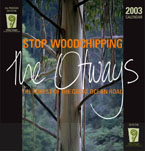 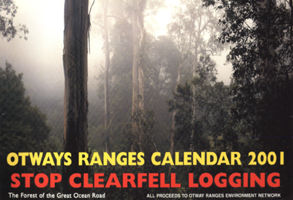 Examples of OREN Calendars. |
Calendar sales money was then used to fund a radio (listen) and print advertising campaign in the Geelong region in lead up to the 2002 election.
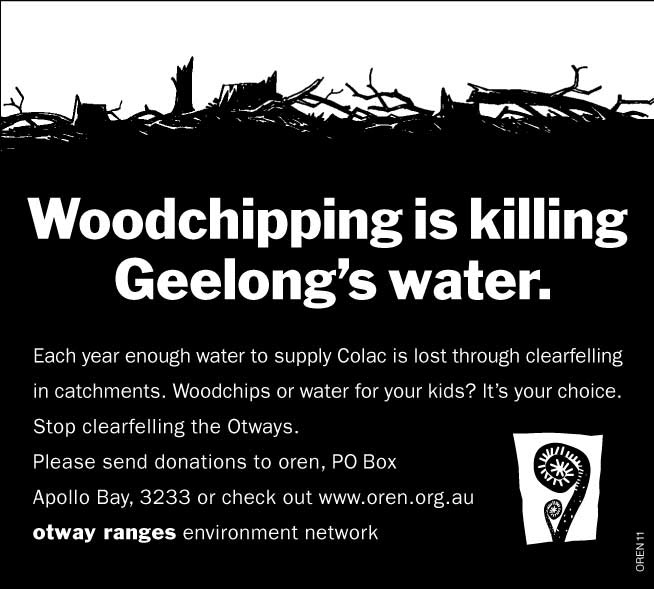
Example of OREN water advertisement. Click to enlarge
OREN made it clear to both the ALP and Liberal MP's in the Geelong region, that OREN on behalf of the community would campaign against them if they did not tear up the RFA.
Ian Trezise, the MP for Geelong, revealed the concerns he had in the lead up to the 2002 election.
See Hansard, extract from September 2005.
4. The 2002 Victorian State election
Within days of calling the 2002 State election, the premier Steve Bracks went to Triplet Falls in the Otways (6th November 2002) and made two announcements:
See ALP 2002 policy. |
 Former Premier of Victoria, Steve Bracks. (1999-2007) |
The announcement was strongly endorsed by OREN and the community. Read 2002 media statements.
Bracks knew public opposition to logging in the Otways was very strong and was confident enough to announce the Otway policy early in the 2002 election campaign.
The other political parties and native forest woodchip industry had about three weeks to respond to the Bracks Otways re-election policy. The Liberals and native forest woodchippers argued strongly for legislating all the Victorian RFA's and threw everything they had at the Government to try and influence voters.
4.1 RFA support split major parties during 2002 Victorian State election.
The Bracks Government decision to cancel the West RFA was based on the fact that the whole community had participated in the process and successfully exposed it as a dishonest public relations exercise that only focused on clearfell logging for woodchips and a few sawlogs but ignored non-timber forest values such as tourism, water and nature conservation.
This community sentiment was used by Premier Bracks to fundamentally justify the new ALP Otway policy position.
“We have listened to the community and we will now act on behalf of future generations to save the Otways,” Mr Bracks said. Front page, Geelong Advertiser, 7 November 2002.
However the Liberal Party could just not see this. Instead they misrepresented the findings of the State governments Sustainable Logging Review by claiming current logging rates were found to be sustainable for the Otways. This was a distortion of the reports findings which defined a 'maximum rate' and 'optimum rate acceptable to the community'. The optimum logging rate the Bracks government policies was promoting was (and still is) zero. See more.
Hence the ALP and Liberals forest policies were in stark contrast. The ALP wanted logging stopped, the Liberal Party supported logging the Otways under the Regional Forest Agreement. See Liberals 2002 Victorian forest policy.
Opposition Liberal leader Robert Doyle just did not understand the political implications of his support to legislate all the Victorian RFAs that Prime Minister John Howard had signed. His comments in the press reflect his ignorance of the political significance the native forest logging issue had become in Victoria. For example, questions put to Robert Doyle by the Herald Sun show how out of touch he was. Extract from Herald Sun: 26th November 2002, page 11. Opposition Leader Robert Doyle spoke with the Herald Sun’s John Ferguson, Andrew Bolt and John Beveridge ahead of the state election. Now, I think it’s one of the fascinating policy divides of the election campaign. There is an RFA in place, an agreement between the Commonwealth and the State, there is a report brought down in February of this year, the Government’s own report, telling them that sustainable logging is the case in the Otways, with a saw log based industry, and two days into the election campaign Steve Bracks goes down and rips the arrangement up. I mean, presumably, for some inner city green votes. We said on the other hand, look if the signs say it’s not sustainable, like in the Wombat, then we don’t clear fell. But if it says it is sustainable, then you’ve got to make up your mind whether you want a sawlog industry or not. And we have enough forests, if you want forests, go out there, there’s plenty. We do not need more forests. Herald Sun: Would you agree that we’ve got forests coming out of our ears?
|
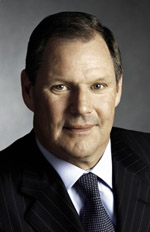 Robert Doyle was Liberal opposition leader during the 2002 State election. |
Also see Labor forest policy a watershed The Age, 21st November 2002.
4.2 Liberals were electorally punished for their RFA support.
The first Saturday after the ALP Otway policy announcement, the Geelong Advertiser editorial opinion (9/11/2007) supported the Bracks ALP Otway policy and criticised the Liberals for being in a "deep sleep" in relation to community concerns.
On the actual polling day, the Liberal Party’s Geelong team was decimated. It failed to win in every local seat; including the loss of two Lower House seats (Bellarine & South Barwon) and one upper house seat it previously held.
See Case Study: Liberals lose Bellarine and South Barwon due to their Otways logging / Regional Forest Agreement support.
OREN ran advertising on radio and print media, attacking the Liberals for wanting to legislate logging in the Otways water supply catchments.
Example of print advertisement produced by OREN that
targeted
the Liberal Party Otways policies.
An OREN opinion article was published in the Geelong Advertiser (28 Nov 2002) and summarises why the Regional Forest Agreement was political poison to all those who supported it.
During and after the election, Geelong Liberals admitted their support for Otway logging under the Regional Forest Agreement politically sank them. See Liberals support Otway logging ban.
The native forest logging industry continued to lobby the State Liberal Party to support legislation for all five Victorian RFA’s. However this was exposed again by OREN in the 2006 State election. Read more.
4.3 Logging industry advertised Regional Forest Agreement demise.
The Victorian Association of Forest Industries (VAFI) openly acknowledged that the ALP Otway policies meant the West RFA was cancelled and that the other four Victorian RFA's were also vulnerable to the same fate. To get the message out, VAFI conducted an advertising blitz, presumably funded by the $250,000 campaign "investment" fund VAFI had previously announced. These advertisements paid for by the woodchip industry, actually helped the Otways campaign. This advertising campaign had no impact on the final poll result in the Geelong region. Instead, the more the Liberals and logging interest groups campaigned for the Victorian RFA’s to be legislated, the more votes they lost. See case study for Bellarine and South Barwon. Industry groups falsely claimed the State Government decision to break the West RFA was a breach of a contract. This was disputed in an article in the Geelong Advertiser titled “RFA not a contract: Thomson.”
|
|
4.4 Logging industry anti Otway election campaign(2002) focused on Morwell, not Geelong.
Officials from the forestry union were furious with the ALP and campaigned to undermine the re-election of the Bracks government. Two forestry union officials were so angry with the Bracks government decision, one resigned from the ALP and both threatened to stand as an independent against ALP candidate in the seat of Geelong.
However these union officials knew they would be wasting their time. Despite all the grandstanding, neither of them stood in Geelong.
The Bracks Otway policy was overwhelmingly popular and the logging industry advertising and media campaign in Geelong was reminding the community to vote for the ALP to stop Otway native forest from being woodchipped.
Unionist plans to lop Labor A timber industry unionist from Moe is considering entering the race for the seat of Geelong as an independent candidate. Brad Platschinda lives more than 200 kilometres from Geelong, but feels issues in the city, particularly threats to industry, are "close to home". Disillusioned with the Labor Party for what he calls betrayal of its traditional roots, the Construction, Forestry, Mining and Energy Union forestry division Gippsland organiser will speak to industry figures in Geelong before deciding whether to throw his hat in the ring. Mr Platschinda said Labor's pledge to ban logging in the Otways by 2008 and further reduce logging and woodchipping in the Wombat Forest prompted him to run as an independent, and Geelong was one of four seats he was considering. His agenda was to undo some of the damage done by the
Bracks Government, he said. "I want to remind new Labor of what traditional Labor stood for. Honesty, decency, family and the right to work." Asked about his knowledge of the seat and its candidates, Mr Platschinda said he was aware Labor held the seat. "I am not too familiar with the opposition," he said. The 30-year-old father of four, who is a former timber
worker, said he would direct preferences to the candidate who would best
look after workers and guarantee jobs in the industry. |
Union official logs off A logging union official yesterday quit the ALP over
its promise to end logging in the Otways. |
The industry groups and Forestry Union conceded defeat in the Otway during the State election campaign and instead began a defensive containment campaign. This containment campaign was designed to send a warning to the State government to not repeat what was happening to the Otways in eastern Victorian forests.
Thus the safe ALP seat of Morwell (Latrobe Valley) in Eastern Victoria was targeted by the union who stood their own independent candidate.
Within the electorate of Morwell there is a strong pro-logging community centred around the Australian Paper Pulp mill and its associated native forest logging industry. An anti-Otways campaign in Morwell had a better chance of applying some political leverage over the State Government to not extend its Otways policies to other areas. Of particular concern to the loggers is a possible future ban on logging in the Melbourne State forest water supply catchments, a ban similar to what had effectively been announced for the Otways.
A "lavish" advertising campaign played out in the Latrobe valley during the last two weeks of 2002 Victorian State election campaign and was heralded as a successfully warning by the native forest logging industry.
See detail about loggers 2002 Morwell election campaign.
5. OREN / Otways campaign a “Watershed”. Loggers pay tribute to OREN.
The OREN / Otways campaign impacted half (50%) of all the RFA's signed in Australia. Of the ten RFA's that have been signed, five are in Victoria. Of these, the West RFA was cancelled outright and the other four Victorian RFA have not received the complementary legislation from the State Government that would lock them in.
The National Association of Forest Industries(NAFI) newsletter (27 November 2002) acknowledged that the Victorian State government had walked away from the five Victorian RFA's.
Government decisions on the Otways and Goolongook forests are in breach of the harvesting zones agreed to in a series of State Regional Forest Agreements (RFAs). Download NAFI newsletter.
Similarly at the same time, the Federal Liberal Forestry Minister publicly acknowledged the demise of all five of the Victoria RFA's in 2002. At a VAFI dinner the Federal Forestry minister gave the following speech that warned the Victorian State government was fundamentally not meeting its RFA commitments.
Extract of Senator Macdonald's speech to the Victorian Association of Forest Industries' annual dinner on the 22 November 2002. Ladies and gentlemen, by contrast the Commonwealth Government does remain committed to the 5 Victorian Regional Forest Agreements. Our Government enacted the RFA legislation as Greg just mentioned in May this year. While the passage of the Commonwealth RFA has removed any sovereign risk by a future Commonwealth Government, the inescapable reality of course is that State Governments do bear the Constitutional responsibility for forest management. That's why I call upon the next Government of Victoria, which ever it is, to introduce complementary RFA legislation to provide legislative backing to Victoria's RFA's. And whilst I agree that an agreement signed by the Victorian Premier and the Prime Minister should not need legislative backing obviously history has shown that is absolutely essential and as I say it is essential that we have that legislative backing in Victoria to lock in once and for all the security to forest industries and regional communities and for conservation interests that the RFA's were certainly intended to provide. Read full transcript. |
 Queensland Senator, Ian MacDonald, former Federal Minister for Fisheries, Forestry and Conservation. |
Hence the OREN / Otways campaign has been recognised as a “watershed” by both academics and the native forest logging industry in turning around the march to native forest 'resource security' through the Regional Forest Agreement process.
According to Wikipedia, 'watershed' is defined in this context as “Any moment or event separating two distinct periods of time, a momentous event that alters the course of time.”See Labor forest policy a watershed, The Age, 21st November 2002.
In what can only be described as a 'tribute', a report prepared for the Victorian Association of Forest Industries in March 2006 by Allen Consulting titled “Victoria's Forest Industries, An Economic Impact Assessment”, reported that the native forest logging industry regards the Otways campaign outcome as a “watershed” that had a sever impact on State wide native forest logging industry.
Victoria's Forest Industries,
|
|
The Allen Consulting report and Otways campaign was reported in the Business section of The Age in 2006.
OREN had a right of reply letter published in The Age a few days later.
In conclusion, the following Hansard from 2004 articulates the fact that the legislated RFA resource security agenda being pushed by native forest woodchip companies in Victoria was crushed largely thanks to the Otways campaign.
Victorian Parliament Hansard, 5 October
2004, Page 593
Timber industry: Regional Forest Agreements
Mr RYAN (Leader of The Nationals) -- My question is to the Premier. Is the government going to honour the remaining regional forest agreements in Victoria, or is it going to destroy the timber industry, just as Mark Latham proposes to destroy it in Tasmania?
Mr BRACKS (Premier) -- I thank the Leader of The Nationals for his question. I indicate to this house that the policy referred to by the Leader of The Nationals -- the policy announced by the Leader of the federal Labor Party, Mark Latham, when he said he would have a scientific examination of the future of the regional forest agreement and a significant compensation package -- is something that I support.
I indicate to the Leader of The Nationals that when we came to office we had an unsustainable position in our forests whereby there were contracts signed up for timber which was not there. We had to face up to the science and to what was there to provide for those contracts. As a consequence we had to reduce logging in Victoria by some 30 per cent across the board. We have done that with Our Forests Our Future. We have raised compensation of about $80 million for communities, for workers in the industry and for companies in the industry, and that compensation has been completed -- and completed successfully. We now have a much more honest, open and transparent system in our forests here in Victoria. We took action to cancel one of our regional forest agreements here in Victoria, which I committed to at the last election when I committed to creating a new national park in the Otway Ranges. We know the National Party is opposed to the new national park; we think the Liberal Party is opposed to it.
Mr Ryan -- On a point of order, Speaker, the Premier is debating the question. He should at least say that he is after the Greens preferences, just like Mark Latham is in Tasmania!
The SPEAKER -- Order! I believe the Leader of The Nationals is debating the issue! The Premier, to continue.
Mr BRACKS -- In relation to the regional forest agreements, we cancelled
the agreement associated with the Otway National Park, and we are proceeding
with the national park through a reference to the Victorian Environmental
Assessment Committee. It is interesting to note that we know the National
Party is opposed to that national park but we are not sure about the Liberal
Party. What we do know is that the local federal member for Corangamite,
who said he was opposed to the national park, is now running at 250 miles
an hour to say he is in favour of it! It is interesting to see how he
wants to get on board with a good environmental policy from our government.
We know where the National Party stands: it is opposed to it, and we know
it has a different view to us. We are not sure where the Liberal Party
is, but we are committed to a much better, transparent process in our
forests and committed to a new national park for the Otway Ranges.
Don't know the meaning of a word? Check the glossary.

